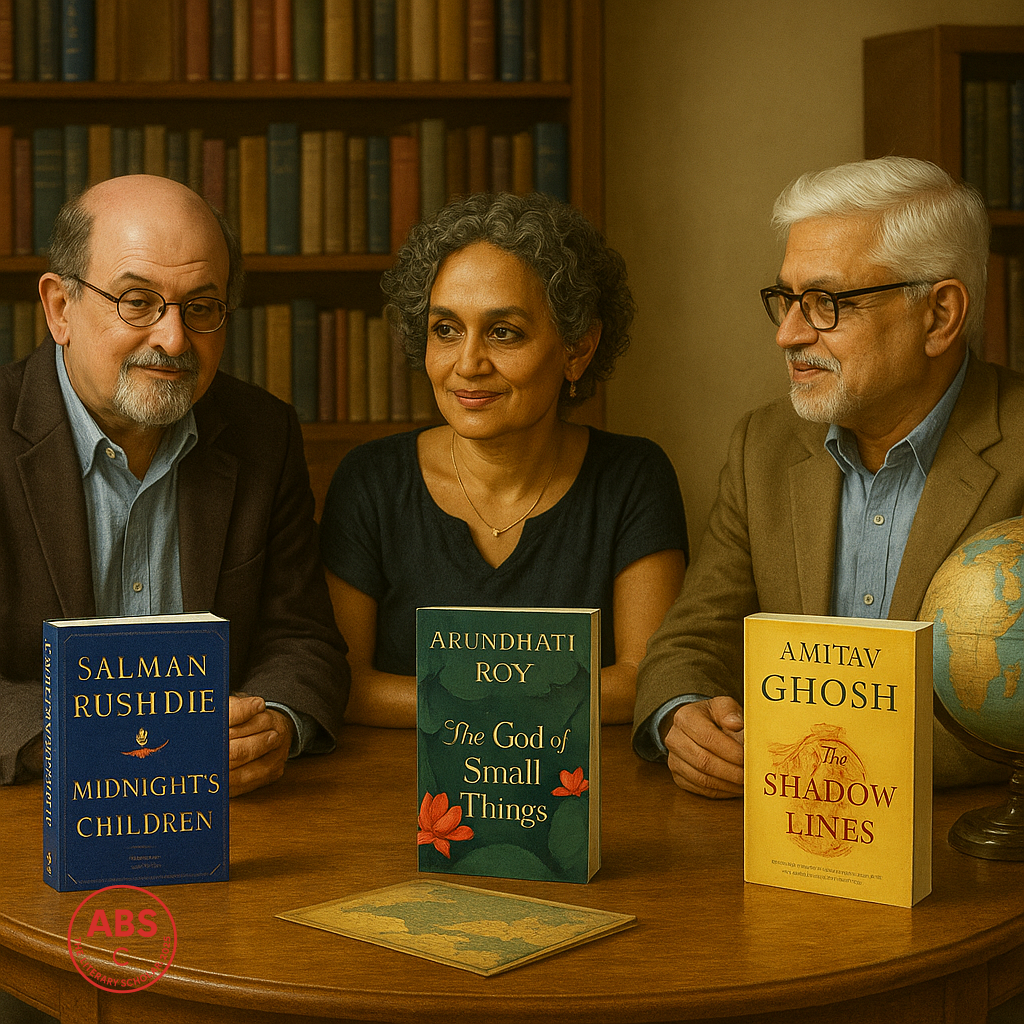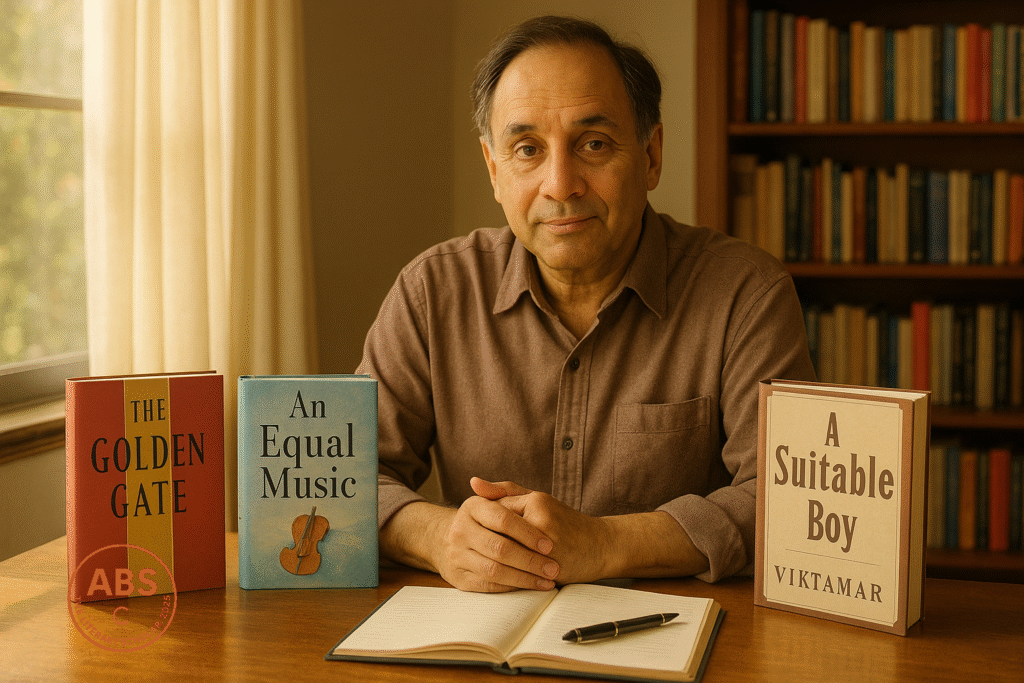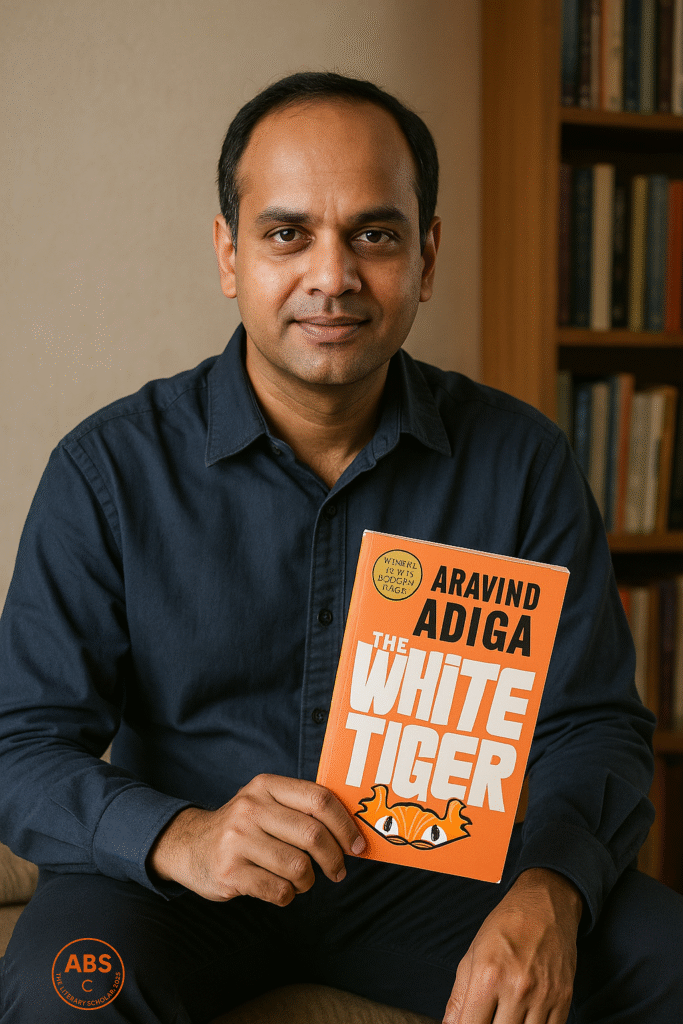Rushdie, Roy, Ghosh, and the Globalisation of Indian English Fiction
By ABS, The Literary Scholar, who believes commas can cross continents, and novels can whisper louder than nationalism.
There comes a moment in every literary tradition when someone turns around, tosses out the rules, and says, “Let’s make a mess.” For Indian English Literature, that someone was Salman Rushdie, and the mess was Midnight’s Children.
What followed was not just chaos—it was magic realism, fractured time, defiant language, political allegory, and several Booker Prizes. It was as if Indian English fiction looked at the modest drawing rooms of Desai and Sahgal and said, “Lovely. But what if we added a talking nose, a riot, and thirty years of colonial guilt—all on page one?”
This scroll is about those literary daredevils. The ones who didn’t just write about India—they wrote India anew. With glittering prose, tangled timelines, and just enough historical drama to warrant a glossary.
Welcome to the era of literary globalisation—where Indian novels became airport hardcovers, seminar topics, and, occasionally, banned books.
Salman Rushdie: When English Got Masala and the Booker Became a Side Dish
If Raja Rao gave English an Indian soul, Salman Rushdie gave it an Indian nervous breakdown—with fireworks.
Midnight’s Children (1981) is not so much a novel as a literary cyclone. It begins with the birth of Saleem Sinai at the exact moment of India’s independence and proceeds to unravel the nation’s destiny through his magical, often runny nose.
“I was born in the city of Bombay… once upon a time.”
And just like that, he rewrote how India could be written.
Rushdie’s sentences are long. Too long. Delightfully long. They run, tumble, and do a cartwheel before landing on a pun. His language is part comic strip, part Sanskrit chant, part British satire. And it works—spectacularly.
He made chaos respectable. The Satanic Verses (1988) turned fiction into global controversy and Rushdie into literature’s most famous fugitive. But beyond the headlines, Rushdie redefined what it meant to be Indian, Muslim, postcolonial, and exiled—all while inventing new compound words every ten pages.
He made it okay to be messy, multilingual, and mythic. In other words, he made it okay to be Indian—and unapologetically global.
Arundhati Roy: The God of Small Sentences That Wreck Your Soul
If Rushdie made prose explode, Arundhati Roy made it shimmer—and then shatter you.
The God of Small Things (1997) didn’t just win the Booker Prize. It quietly rearranged your organs while pretending to be about a pickle factory in Kerala.
Roy’s prose is like a lullaby played on broken glass—achingly beautiful, devastatingly sharp.
“They all broke the rules. They all crossed into forbidden territory. They all tampered with the laws that lay down who should be loved, and how. And how much.”
The novel bends time. It doesn’t so much have a plot as it has an emotional earthquake measured across decades. Forbidden love, caste, childhood trauma, communism, Kathakali dancers—it’s all there, dancing in a story that dares you to breathe.
Roy’s genius is in the details—the small things. A gesture. A phrase. A swollen river. And suddenly, you understand entire systems of oppression.
She wasn’t just writing fiction. She was rewriting memory.
After that, Roy stopped writing novels and became a full-time dissenter, essayist, and conscience of the country. But The God of Small Things remains a single, shining act of literary rebellion. And yes, the grammar rules were broken—on purpose.
Amitav Ghosh: When History Got a PhD and a Passport
Now we enter the polished, scholarly universe of Amitav Ghosh, the man who decided fiction should come with footnotes, archival research, and a shipping route.
If Roy writes with a poet’s anguish, Ghosh writes with a cartographer’s precision. His The Shadow Lines (1988) made time and geography collapse into one long, eloquent sigh. It’s a novel where memory becomes borderless, and storytelling becomes a form of rebellion.
“What had happened was only that people had decided to draw a line, to create a frontier.”
And with that, Ghosh erased it.
Then came The Glass Palace, The Hungry Tide, and most recently, the majestic Ibis Trilogy—three novels about opium, colonial trade, indentured labour, and ships with names like Neel Rattan and Anahita.
Reading Ghosh is like attending the finest lecture on empire, only the lecturer has weaved in a tragic love story and possibly a cyclone.
He gave Indian English fiction its first true global canvas—not just geographically, but thematically. Ecology, migration, commerce, and cultural violence—wrapped in a perfectly ironed sentence.
And yes, you may occasionally feel under-read while reading him. But you’ll come out of it smarter, shaken, and in awe.
Vikram Seth: The Polite Prodigy Who Wrote a 1,349-Page Novel Because He Could
Enter Vikram Seth, the literary unicorn who doesn’t write often—but when he does, the novel is the size of a small goat.
A Suitable Boy (1993) is a wedding, an election, a romance, a generational saga, and a national census disguised as fiction. It’s also charming, elegant, and infuriatingly well-structured.
“You too will marry a boy I choose.”
And with that one sentence, the novel begins—and proceeds to explore everything from shoe manufacturing to Urdu poetry.
Seth’s talent is ridiculous. He writes prose like poetry and poetry like mathematical formulas. The Golden Gate is a novel entirely in sonnets. An Equal Music could make a cello weep. He is the overachiever your English teacher warned you about.
But beneath the craft lies compassion. Seth’s novels don’t explode like Rushdie’s or shimmer like Roy’s—they unfold gently, like conversation over dinner.
He brought gentility to grandeur. And somewhere in the middle, reminded us that the politics of marriage and the politics of Parliament often use the same passive-aggressive strategies.
Aravind Adiga: When the Underclass Finally Hijacked the Narrative (and the Honda City)
If the others wrote about India’s conscience, Aravind Adiga wrote about its underbelly—and gave it a grin as sharp as a butcher’s knife.
The White Tiger (2008) didn’t just win the Booker Prize. It burst into the literary party wearing fake sunglasses, stole the silverware, and drove off in a stolen car with your existential comfort in the backseat.
“The story of a poor man’s life is written on his body, in a sharp pen.”
Meet Balram Halwai, servant-turned-murderer-turned-entrepreneur. He’s not your average protagonist. He’s morally questionable, darkly comic, and violently self-aware. And he speaks directly to the reader—like a TED Talk delivered from a dimly lit teashop with slightly suspicious intentions.
Adiga’s voice is lean, fast, and unapologetically cynical. He rips through the shiny surface of “Shining India” to show the rot underneath: corruption, casteism, class disparity, and spiritual exhaustion. And he does it with so much wit, you almost forget someone just committed a murder on page 88.
While Rushdie broke language rules and Roy broke hearts, Adiga broke illusions. He made the servant speak—and made the world listen. The White Tiger isn’t just a novel; it’s a confession, a provocation, and a punch in the reader’s moral solar plexus.
Imagined Scene: The Global Gala of Indian Lit
Now picture this grand gathering:
Rushdie is still at the bar, remixing mythology with martinis.
Roy has taken over the podium with a fiery speech on the politics of language and love.
Ghosh is meticulously correcting a map in someone’s novel set in Calcutta.
Seth is somewhere near the piano, composing an elegy for lost syntax.
Adiga just hotwired the valet stand and is taking their limousines for a spin around Delhi’s Ring Road—with Balram narrating.
Together, they form the loudest, most linguistically fearless literary rock band India never knew it had.
Imagined Scene: The Global Gala of Indian Lit
Picture it: a global literary summit.
Rushdie is at the bar, making wordplay out of cocktail names.
Roy is in a corner, refusing photo ops and writing a manifesto on a napkin.
Ghosh is trying to explain indentured labour to a confused British journalist.
Seth is politely tuning a sitar someone left on stage and quietly correcting everyone’s grammar.
They are nothing alike. And yet, together, they redefined Indian English fiction.
What They Really Did
They globalised it.
These weren’t just authors—they were literary events. Each novel became a passport: for the writer, for the reader, for the entire genre.
They made publishers sit up. They made critics rethink. They made Indian literature a literary superpower—not for how it mimicked the West, but for how it refused to.
Rushdie played with language. Roy bent it. Ghosh refined it. Seth serenaded it.
They gave Indian English fiction:
New narrative structures
International legitimacy
Booker Prizes (with proper postcolonial smugness)
And a global audience still recovering from chapter one
As ABS folds the scroll, still chuckling at Saleem Sinai’s multipurpose nose and wiping a tear from Ammu’s eyes, there’s a pause. These weren’t just books. They were milestones—literary declarations of independence from both colonial guilt and narrative mediocrity.

Signed,
ABS
The Literary Scholar
Who once tried to map the timeline in The God of Small Things and woke up in The Hungry Tide, surrounded by literary awards and emotional debris


Share this post / Spread the witty word / Let the echo wander / Bookmark the brilliance
